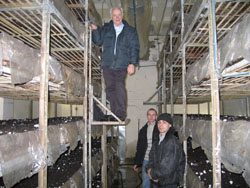You are here » Home » Telling Our Story
Success Story
Volunteer helps farmers decrease dependence on imported compost
From Decay Grows New Opportunity

Photo: CNFA/Ralph Kurtzman
Recommendations by Ralph Kurtzman (top), in a mushroom production facility in Ukraine, may give local producers a domestic source for compost.
The members of the Association of Mushroom Producers can produce 900 tons of mushrooms a year, which sell for upwards of $1.6 million. This has the potential to greatly impact incomes in Ukraine’s mushroom producing regions.
The Association of Mushroom Producers in central and western Ukraine helps its more than 150 members to pool resources in order to improve production, access more lucrative markets and increase incomes.
One problem that the association members face is a serious lack of affordable compost — essential for growing mushrooms — on the domestic market. While mushrooms in the wild can grow on a tree or a dead log, in commercial production, compost composed of wood chips, coffee grounds, manure and other substances provide the mushrooms with the nitrogen and carbohydrates needed.
Due to a lack of commercially available compost in Ukraine, compost is usually imported from Poland or Russia at a price twice that of domestically produced compost. This has created an opportunity in Ukraine for enterprising mushroom growers to cut their costs by producing their own compost.
A volunteer from a USAID farmer assistance program, Ralph Kurtzman, traveled to Ukraine to help the association with compost production. Ralph made a wide variety of recommendations that together have the potential to both cut costs and improve the mushroom growers’ production.
His recommendations addressed the members’ need to change their watering and compost disposal methods to increase productivity, as well as to control diseases. If the members follow Ralph’s recommendations, they stand to gain by lowering production costs.
Diagnosing the problem and making efforts to overcome it through technical volunteer expertise is the first step to increasing profits and expanding mushroom production in Ukraine. Volunteer Omon Isikhuemhen provided the association with further guidance, following up on Ralph’s recommendations, as well as explored the possibility of producing exotic mushrooms (such as shiitake) in Ukraine. Volunteer Ahmed Awad also made a follow-up visit, sharing his expertise in new methods of mushroom preparation and packinghouse construction and operations.
Print-friendly version of this page (533kb - PDF)
Click here for high-res photo
Back to Top ^ | 

